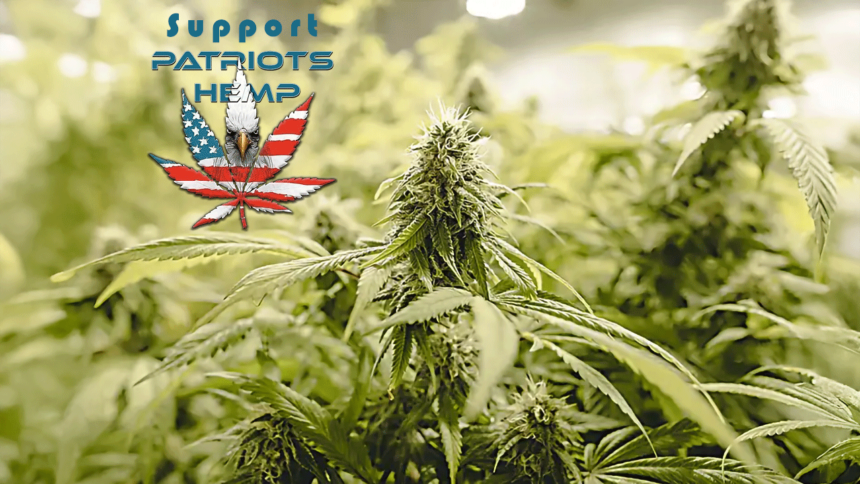The U.S. Supreme Court on Tuesday heard oral arguments in the case of a trucker who sued a cannabis company after he was fired over a positive THC test that he says was caused by consuming a hemp-derived CBD product. Justices during questioning zeroed in on how exactly the worker was harmed by the incident and whether his losses qualify for triple damages under federal law.
Douglas Horn filed a legal challenge against the business that made the cannabis product, Medical Marijuana Inc., in 2015, suing under the Racketeer Influenced and Corrupt Organizations (RICO) Act. He alleged the company falsely advertised the product as having “0% THC,” which is why he decided to try it for pain management. His employer later fired him after he tested positive for THC.
The substance of the dispute doesn’t center on cannabis law but instead on the boundaries of RICO itself. At issue is whether the statute allows Horn’s civil claim to proceed.
While RICO cases are generally associated with large-scale prosecutions of criminal organizations, the statute can be applied in civil matters as well. In this instance, Horn claims to have been “injured in his business or property” because his employment was terminated due to the positive THC test. He alleges that Medical Marijuana Inc. committed mail and wire fraud, which caused his economic harm.
The question before the high court whether “economic harms resulting from personal injuries are injuries to ‘business or property by reason of’ the defendant’s acts for purposes of civil RICO,” according to a description on the court calendar.
But some justices at Tuesday’s oral argument appeared skeptical that Horn’s firing was a personal injury issue at all. Justice Ketanji Brown Jackson, for example, seemed to distinguish between ingesting the product itself—which she said did not cause harm to Horn—and the subsequent firing, which may be distinct from a “personal injury.”
“There are personal injury claims that derive from a person being harmed by the ingestion of the product, right?” she said. “They’re bodily, physically harmed because they’ve taken this thing. I don’t read this claim to be that kind of injury. He’s not saying that the product itself injured him in any way.”
Lisa Blatt, the lawyer representing Medical Marijuana Inc. at the hearing, dismissed that distinction.
“If I ate poppyseed bagels and failed a drug test, it’s a personal injury,” Blatt said. “If I took a medicine like doxycycline, which is an antibiotic, and I can’t be out in the sun and I lose my job as a lifeguard, it’s a personal injury claim.”
“But why are you saying that?” Jackson shot back, looking for some sort of grounding in legal precedent. “I mean, you’re just saying that.”
The distinction matters because in Medical Marijuana’s view, RICO doesn’t allow victims to recover triple damages for personal injuries.
“No one under this statute can ever recover for personal injuries, full stop. Never ever,” Blatt told the court.
Justice Elena Kagen pointed out that at it’s core, the case is “not a good RICO claim.”
“He buys this thing, he ingests this thing and someone else fires him,” she told Blatt. “This is not a good RICO claim for that reason. But it has nothing to do with the reason that you’re giving.”
Easha Anand, the attorney for Horn, acknowledged later in the hearing that the fired trucker has “a heavy burden on remand” if the Supreme Court allows the case to proceed, “but that’s not the argument before you.”
Anand added that she believes her side can demonstrate that the business harm Horn suffered was the direct result of a civil RICO violation on Medical Marijuana Inc.’s behalf, but emphasized that that’s a separate question than what’s before justices in the current matter.
“We think we can prove proximate cause,” Anand said, “but again, that’s a question for remand, not for this court.”
The case is Medical Marijuana Inc. v. Horn and is expected to be decided by the high court by June.
The U.S. Court of Appeals for the Second Circuit previously sided with Horn and allowed the RICO suit to proceed, writing that his “termination cost him current and future wages and his insurance and pension benefits–all of which were tied to his employment.” That injury falls under the plain meaning of the word “business” in the RICO statute, the opinion said.
But Medical Marijuana Inc. appealed that ruling, and Supreme Court justices agreed to take up the case in April.
The business contends that “RICO’s text is clear”—but in the other direction.
“Plaintiffs cannot sue for personal injuries. Plaintiffs cannot bypass that bar by brandishing receipts for the economic costs of personal injuries. Case closed,” the company’s most recent brief says.
A number of notable groups have filed friend-of-the-court briefs in the case, including the U.S. Chamber of Commerce, the U.S. Hemp Roundtable and others.
The Chamber of Commerce says the Second Circuit’s earlier ruling in the case was wrongly reasoned, warning that an overly expansive reading of RICO damages could “explode” the statute.
“The Second Circuit was dead wrong to characterize this case as arising from a ‘defect…inherent in the statute as written’ that only Congress can fix,” it said. “Congress did its job, and allowed plaintiffs to recover only for injuries to ‘business or property’—not for personal injuries and their indirect economic consequences. The necessary limits are textual and should be enforced in accord with civil RICO’s established focus on economic injury.”
The U.S. Hemp Roundtable, for its part, told justices in its amicus brief that the hemp industry would be “adversely affected” if the court’s ruling ultimately expands businesses’ liability in tort cases.
“Here, the RICO targets are industry participants,” the trade group said, arguing that the hemp industry is “multi-layered and creates a myriad of societal benefits.”
“The threat of expansive liability aimed at those in the industry directly jeopardizes the Roundtable and its mission,” its filing says.
In another amicus filing, the American Association for Justice sides with Horn, arguing that Medical Marijuana Inc.’s claims about personal injury cases “have no basis in the real world and cannot justify limiting the reach of civil RICO.”
Given the court’s focus on RICO and unpacking the limits of that federal law, even groups far from the hemp industry have weighed in. The Human Trafficking Legal Center, for example, opposes Medical Marijuana Inc.’s reading of the statute because it says such a narrow view “could bar trafficking survivors from pursuing RICO claims for economic injuries that flow from personal injuries.”
“If petitioners’ rule reigns, trafficking survivors who have endured a similar plight…might not receive due compensation for their economic injuries,” the advocacy group said in its brief. “Their captors and others like them could perpetrate trafficking and racketeering activities without having to face the deterrent of trebled damages.”
In a separate case that was settled in January, the Drug Enforcement Administration (DEA) rehired and is providing back pay to a special agent who was fired after testing positive for THC that he attributed to CBD he was taking as an opioid alternative for chronic pain, with the agency reaching an agreement in a lawsuit challenging the termination.
Other cases currently in federal courts have been plumbing the boundaries of Second Amendment rights as they relate to marijuana users. Earlier this month, for example, lawyers in an appeals court case faced off over when the government may lawfully disarm someone for using marijuana. The Department of Justice (DOJ) argues that merely a person’s recent use of the drug is sufficient to establish that they’re in violation of the law and should not legally be able to possess a gun.
Judges on the U.S. Court of Appeals for the Fifth Circuit, however, pushed back on the government’s position, noting at oral argument on Tuesday that a recently published opinion within the same judicial circuit held that while “some limits on a presently intoxicated person’s right to carry a weapon” may be constitutional, “disarming a sober person based on past substance usage” is not.
That case is U.S. v. Daniels, which earlier this year was set to be considered by the U.S. Supreme Court but was among a number of firearms-related cases remanded back to lower courts following a separate ruling about firearms and domestic violence.
Courts across the country have been considering the constitutionality of the government’s ban on gun and ammunition ownership by people who use marijuana, which remains illegal under federal law. And generally jurists have been skeptical of the sweeping Second Amendment restriction.



















